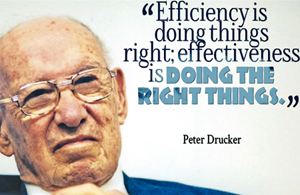Living Mindfully with
Aruna Manathunge
Mindfulness in the Business World - Part 3:
Systematic Abandonment
 The
benefits gained from reducing harmful levels of stress among the workers
are well-known and widely accepted. So let's step into a lesser known
but equally important area for the organization through Mindfulness. It
flows from last week's introduction to 'Reset of Attention'. The
benefits gained from reducing harmful levels of stress among the workers
are well-known and widely accepted. So let's step into a lesser known
but equally important area for the organization through Mindfulness. It
flows from last week's introduction to 'Reset of Attention'.
Management Guru Peter F. Drucker
The late Peter Drucker (1909-2005) is considered to be the most
influential thinker of Management who contributed to the practical
foundations of the modern business corporation. One of the remarkable
abilities of Drucker was his ability to foresee and predict 20-30 years
ahead of his time with regards to evolution and mapping of
organizations.
Drucker talked about the importance of managing one's self and also
emphasized a great deal about the fact that as a culture, the modern
western societies had over-focused on analysis and thinking and
under-emphasized on training perception and seeing. He understood that
seeing clearly is essential in a changing world in which our maps of
reality become out dated. When our maps are outdated we may unwittingly
bring out negative results to our organizations.
There was a practice he termed 'Systematic Abandonment', in which an
organization takes a regular inventory of what it's doing and why, and
asks whether it is providing good results. If it isn't, the organization
needs to change, to free up resources to do something better. This is
Mindfulness at an organizational level.
Drucker understood the importance of perception, the importance that
human beings habitually do things based on static unchanging fixed views
and forget why they are doing those and then run into organizational
results they do not want. Drucker laid down a framework for presenting
Mindfulness in such situations.
Drucker School of Management
The Drucker School of Management has introduced a 28-week course on
Mindfulness for the Management to develop and expand on the framework
given by Peter Drucker. The course is developed by Jeremy Hunter, PhD.
He is a leading teacher of management and a practitioner of Mindfulness.
In the Executive Development program they spend 7 weeks to train
perception and seeing clearly through Mindfulness meditation and actual
life events of the participants. One of the trainings practiced during
these 7 weeks is 'Reset of Attention', the interesting exercise we
discussed in this column last week.
Prof. Hunter says usually the cultural atmosphere in an organization
pressurize the workers at all levels to get into what he calls an
'Efficiency Mode'. The workers go on to produce, to create more of what
they already do and know - more efficiently. This is good only up to a
point. The Reset of Attention exercise and other Mindfulness practices
dramatically change the participants of the course to perceive the ever
changing business scenario with the freshness of a child's mind. Such
managers and organizations can quickly adopt to the change and thrive
due to resulting innovation.
New Scientific Research
In addition, new scientific research into Mindfulness is clearly
proving the benefits to the organization. Studies show that regular
practice of Mindfulness strengthens the immune system of the workers
leading to lower absenteeism from work. Studies have also found that
regular practice of Mindfulness improves the concentration and memory
among the work force. This will help the organizations when introducing
new skills and to improve the productivity output.
The regular practice of Mindfulness re-wire the brains of the
workforce. It is like a gym for the mind. Just as working at the gym
makes the muscles stronger, the regular practice of Mindfulness makes
the minds and the spirit of the workforce stronger, supple and agile.
Recently a study was conducted at a service industry by two US
universities to find out the relationship between workplace mindfulness
and job performance, as well as turnover intention among the
practitioners. The study found that workplace Mindfulness improved both
job performance and job satisfaction among the workers. (Ref. http://hum.sagepub.com/content/67/1/105.full)
The benefits of Mindfulness to the Organizations are both immense and
long lasting.
(Aruna Manathunge has practiced Mindfulness for over 42 years.
During the past 7 years he has closely followed the development of Mind
Science in the Western world. He has had a long career as the Country
Head of Sri Lanka and the Head of the Indian Sub-Continent of an
American Pharmaceutical Multinational company. Presently Aruna conducts
Coaching in Mindfulness to Schools and Companies. Aruna can be contacted
at [email protected]) |

